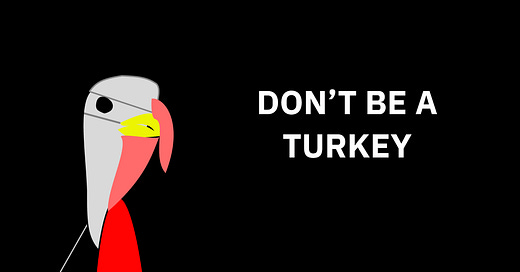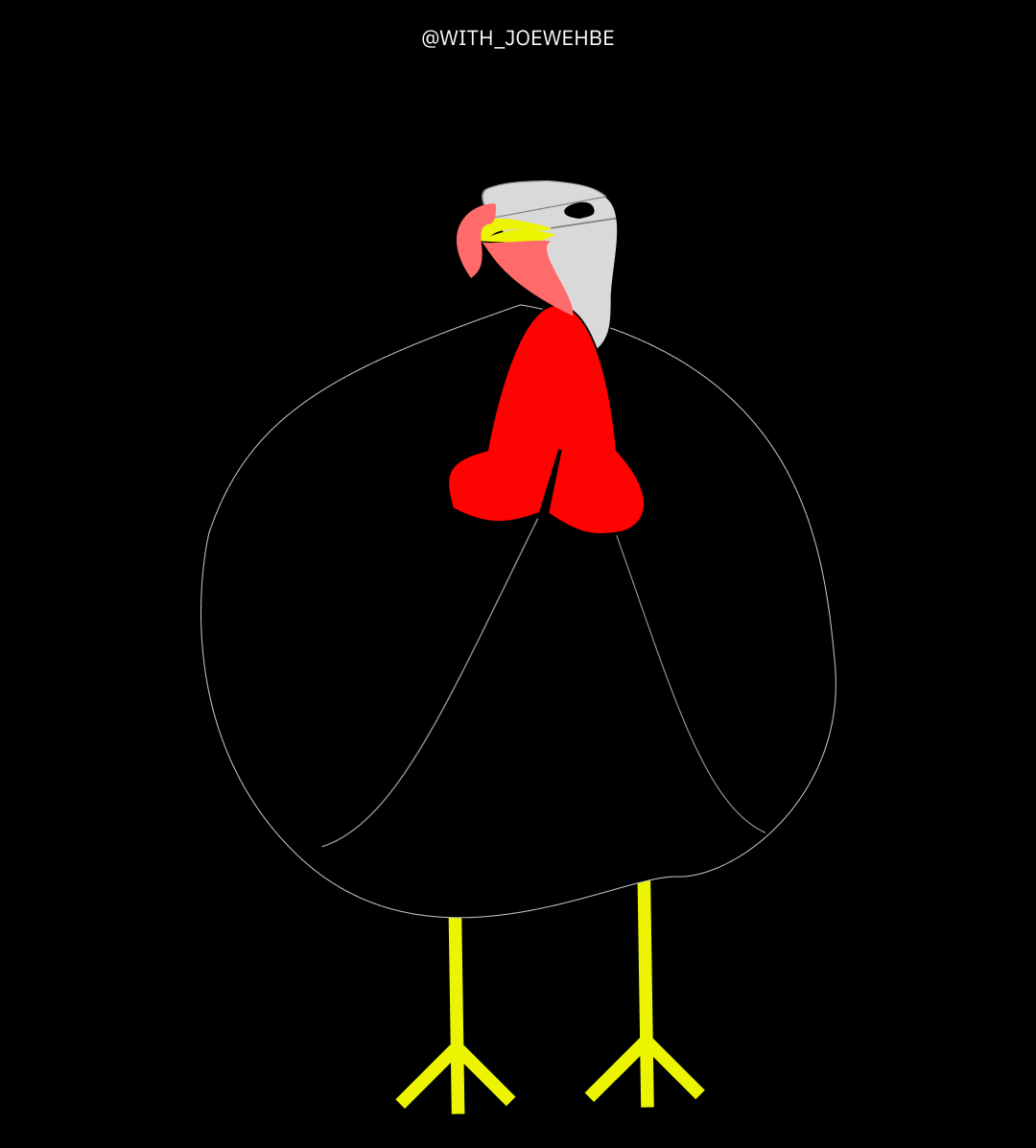If you don’t remember who the heck I am or why you subscribed to this forsaken newsletter, he’s an about.
The Turkey Problem is one of profound essayist and author Nassim Taleb’s funniest fables-cross-analogies. It’s a warning about things looking well, while indicating harm.
Imagine you’re a turkey
Imagine you’re a turkey, captured and sent to live on a farm. You arrive in late November and see decorations up in the farmer’s house, it looks like there’s just been a big feast. But you don’t get to live in the house — your new home is a little turkey pen out back.
At first you’re wary, hesitant. You don’t like the idea of being caged, and worry what the farmer will do to you. But there are plenty of positives — the grass is green, the field protected from predators by a tall fence, and every day you’re fed corn.
This isn’t so bad, you think. After about a month you say to yourself, if the farmer was going to hurt me, wouldn’t he have done it by now?
You feel safer and safer with each passing day. You get comfortable. You start to think life in the farm beats taking your chances in the wild — instead of manically bobbing your head while you run away from foxes, you’re sitting pretty, growing fatter.
This is the life, you think. It could hardly get any better than this.
November comes round again, it’s almost one year since you arrived on the farm, and about as long since you had anything to worry about. You’re excited to see what your loving carers will do for your one year anniversary on the farm. On a regular day, they give you corn, so what will they do for this special occasion?
Just shy of your one-year anniversary, the farmer comes to the yard. Instead of the usual serving of corn, he leads you out back to a shed you’ve never visited before.
You obediently bob along after him. Why wouldn’t you? The farmer has never given you a reason not to trust him.
The farmer says something to you about giving thanks, or thanks giving, you can’t make it out — you’re too excited, too busy bobbing your head. You’re also tired from your short walk because of all the weight you’ve put on. The farmer seems to know this — he invites you to rest your head on a nice neck-high block.
How thoughtful, you say, as you rest your head on the smooth metal surface. It’s a little cold to the touch, and the farmer is gripping you stiffly around the neck for some reason, holding you still. That’s odd, you think. Then you notice the smell — the smell of blood on that cool metal surface.
The last thing you see is the farmer raising a knife high above his head.
The signs of everything going well are not necessarily an indication that things are going well.
The Turkey Problem litters our every day lives with opportunities for similar foolishness and naivety:
At work.
‘The boss is not complaining about my lack of effort. Perhaps I can put in even less effort… after all, I’m getting paid the same. Why should I go above and beyond? Job security is off the charts.’
— John, who was made redundant six weeks later.
The economy.
People always look very calm the day before Wall Street crashes. It’s like they don’t see it coming.
Before getting left at the altar.
‘I have nothing to be nervous about — Gwen has never shown any feelings of reservation. In fact, she’s never shown me any feelings at all. She can be rather withdrawn at times.’
The client who never complained.
‘I can’t believe the client left, there were no warning signs! For three years I’ve been charging him fees while doing absolutely nothing — he seemed happy with the arrangement. I wonder what changed.’
Before getting pulled over.
‘If that cop was going to book me, he would have done it by now.’
Traveller’s Diarrhoea
One recalls a recent trip to Vietnam, where fate was not dared enough by the first iced coffee — the traveller, who may or may not be the author of this newsletter, showed no immediate signs of sickness, so he proceeded to order a second and third ice coffee. Some call it bravery, others naivety — I call it weight loss.
Falling just short of the pearly gates.
I have it on good authority that several estranged relatives of mine will be in for quite a surprise when they reach St. Peter’s Gates. ‘Where were the signs?’ they’ll plead, ‘We did everything required of us, didn’t we?’
Moral(s) of the Story
Take basic precautions against potentially disastrous situations, even if they don’t have early warning signs.
Don’t be a turkey
Last but not least, happy Thanksgiving.
Thanks for reading — I’m Joe, an author, video-maker and podcaster. Here’s my website if you want to navigate my other work.












👏